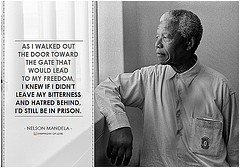At least one generation of intellectuals had stood against apartheid and reflected on Mandela as a political figure of freedom and liberation. Mandela never produced anything equivalent to the political writings of a Gramsci, Fanon, or Césaire. Because of the media and the global support for the struggles he led, Mandela acquired a resonance with effects across the globe. His career, with all its changes, posed challenges for thinking about politics.
Editor’s Note from Paul Bové
Preface by Anthony Bogues
Mbu ya Ũrambu: Mbaara ya Cuito Cuanavale / The Cry of Hypocrisy: The Battle of Cuito Cuanavale by Ngũgĩ wa Thiong’o
Discomforts by Hortense Spillers
The Mandela Enigma by Wlad Godzich
Mandela, Charisma, and Compromise by Joe Cleary
Nelson Mandela on Nightline; or, How Palestine Matters by Colin Dayan
Or, The Whale by Jim Merod
Malaysian Mandela by Masturah Alatas
Mandela, Tunisia, and I by Mohamed-Salah Omri
Nelson Mandela by Ruth Y. Y. Hung
Mandela Memories: An African Prometheus by Ngũgĩ wa Thiong’o
Nelson Mandela: Decolonization, Apartheid, and the Politics of Moral Force by Anthony Bogues
Mandela’s Wholeness, Perhaps Infinite by Dawn Lundy Martin
[untitled] by Gayatri Chakravorty Spivak
Mandela’s Gift by Sobia Saleem

Leave a Reply